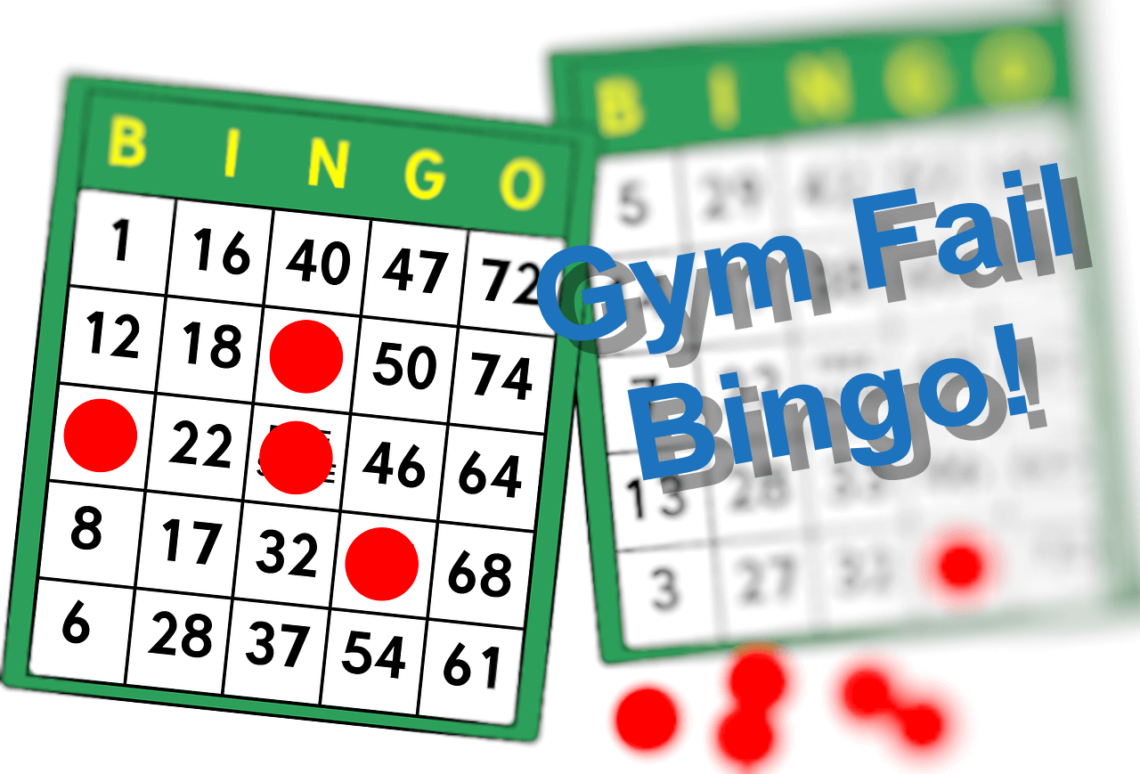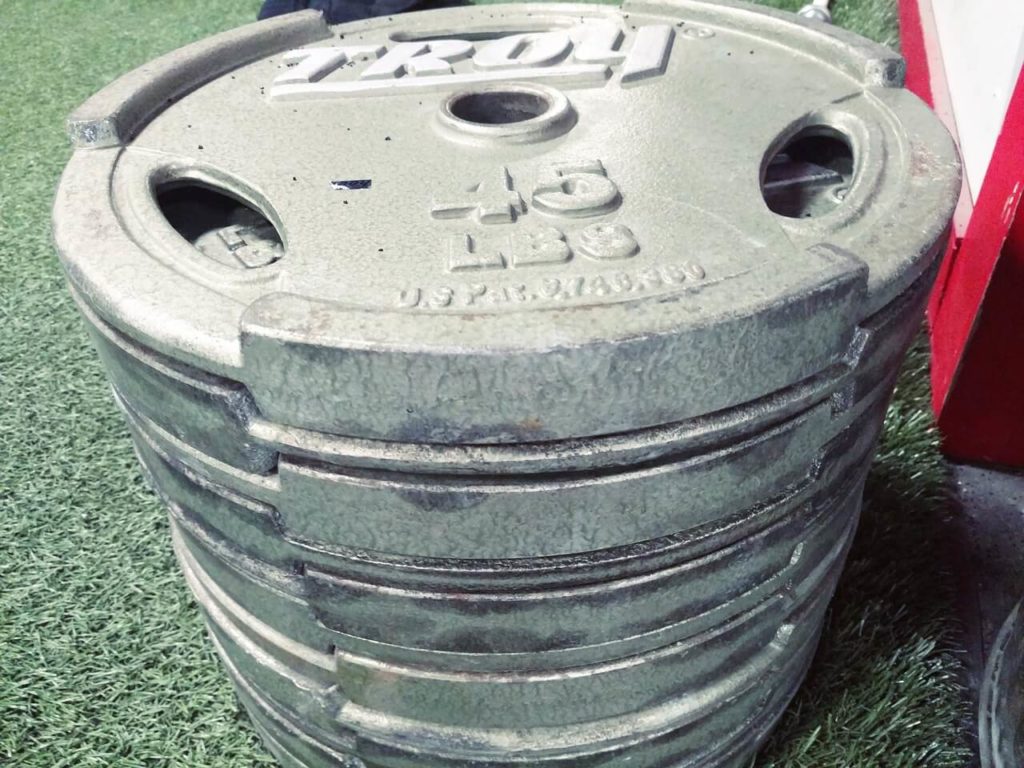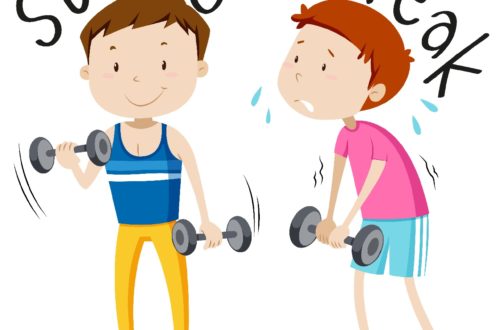
Gym Fail Bingo: Avoid 13 Most Common Exercise Mistakes!
Welcome to Gym Fail Bingo or 5 in a row. This is where you win if you do NOT have many hits. I introduce you to the 13 most common training mistakes that you should absolutely avoid in order to have better success in the gym. Some errors are obvious, others may be less on your screen.
Want to get started and change your appearance, but are you afraid of doing something wrong? Or have you been training for a long time, but you are not changing your body as you would like? Avoid the 13 most common training mistakes!
Content:
Training mistakes: frequency and schedule
1. You train too seldom
2. You exercise too often
3. You have no plan what and how to train
4. You are not exercising your whole body
Trainingsfehler: Trainingsausführung
5. You train too easily
6. You train too hard
7. You only do cardio
8. You are taking too much momentum
9. You don't warm up
Training mistakes: variety and progression
10. You never increase your training weights
11. You always do the same thing
Exercise Mistakes: Drinking and Diet
12. You drink too little
13. You are eating too little and / or too little protein
The 13 most common training mistakes: summary
Training mistakes: frequency and schedule
1. You train too seldom
The first training mistake sounds banal, but many beginners in the gym fail because of it: You want to change your appearance. Your goal is to lose weight or gain muscle, an athletic and muscular body. That's what you signed up for in a gym, that's what you want to do something for.
But it is raining. The day was stressful. You had a little cold (or was that just an excuse?). The sofa is damn comfortable. You haven't been out with your friends in a while ...
And bang: you haven't been to the gym for more than 3 weeks!
Please don't get me wrong: It is not objectionable NOT to exercise. But if you want to change your appearance permanently, develop yourself and see successes and don't just want to do a little sport now and then: Exercise regularly. At least once a week (Full body workout) or several times with a split for example 3 split). Keep an eye on your goal and create fixed dates when you go to the gym. Because you do it for you.
2. You exercise too often
Exercising too often, just like exercising irregularly, prevents you from achieving success and building muscle. Do you go to the gym regularly and hit the keys hard? Great! But don't overdo it. Your muscles grow during the rest days when you are not exercising. And not during training. After training, your body reacts to the heavy load that you put on it during training. Give him enough time to do it and adjust the frequency of your training to your performance level, your training split and your ability to recover
3. You have no plan what and how to train
Another training mistake you can make is just doing something training. So you want to change the way you look. Ideally, you also go to the gym regularly and exert yourself, but nothing happens? If you haven't done anything to exercise beforehand, your body will often react to everything in the early stages. He builds muscles to better prepare you for the training stimulus. But from a certain level he got used to being a little bit burdened.
No matter how often you've gone to the gym so far: Train according to a training plan that suits your performance level and needs. No matter if you just want to get a little fitter, want to build more muscles or have little or a lot of time. Feel free to ask a trainer at your gym. If you have no idea what to do with your workout, read How to Make a Good Workout Plan.
4. You are not exercising your whole body
In my opinion, a fatal training mistake: Of course, everyone has muscles that they would rather train than others. Often it is the classic parts of the chest, six packs and biceps. Ask a child to show how strong they are. It will most likely proudly flex its biceps.
If you only train your body on one side, with the appropriate predisposition, it can not only lead to downright ridiculous looks (for example, thick arms and upper body, but very thin legs). Muscular imbalances can also be the result. In the worst case, one-sided training leads to pain because some muscle groups are too strong and others too weak. Especially nowadays, when many people work in offices and hardly move, back problems due to imbalances are particularly widespread.
Note: It is best to always train the opponent (biceps / triceps, chest / back etc.)
Trainingsfehler: Trainingsausführung
5. You train too easily
A common training mistake that is not only seen in women in the gym: You train too easily. It is certainly right to control your training weight and do the movement properly and without too much momentum. But if you only do 10 reps with your training weight even though you can easily do 20 reps or more, it's just too easy.
There is nothing wrong with alternating heavy and light phases in your training. A couple of weeks easier, a couple of weeks harder. However, if you consistently only choose light weights and then do far too few reps, you will likely be dissatisfied with the results. Your body builds muscles where they are needed. Use appropriately heavy weights to tell him they are needed.
6. You train too hard

Häufiger als zu leichtes Training ist (especially with men) however, observing too heavy training. I used to make the mistake of thinking that only heavy exercise would stimulate my muscles to grow. This is not entirely wrong, but it is also not right for everyone.
If you can move a heavy weight once, you look like you can move it too. Your body adapts to the loads and demands that you expose it to.
If you want to move heavy weights and look like this, you should train like a powerlifter or strongman: Heavy weights for a few repetitions. But be aware of the enormous wear and tear that can occur. However, if you want to look more muscular and athletic, you should do not train with maximum weights. Train with heavy weights that are strenuous for you, but with which you can also manage a sufficient number of repetitions (usually Guide value + -10 repetitions).
7. You only do cardio
What applies to weights that are too heavy or too light also applies to endurance training. Your body adapts to the loads it is exposed to. Some exercisers, the majority of women, spend significant amounts of time on cardio exercise. This is not a bad thing if you want to look like a marathon runner or other athlete in endurance sports. Narrow and thin with as few muscles as possible.
Many athletes in the gym don't just want to get thinner, they also want to build muscles, become stronger and more defined. Cardio tends to reduce mass, certainly some fat, but also muscles and other structures from a certain level. Your body tries to work as efficiently as possible with as little weight as possible. Because every kilo more means more effort and energy consumption. Combine strength training with weights that are heavy for you (not too heavy, not too light) with cardio trainingwhen you want a more athletic look.
8. You are taking too much momentum
You've probably seen a video of a professional bodybuilder training before. Often you will see heavy training weights that are moved with a certain amount of momentum. But should you train the same way?
It makes a difference whether a highly advanced or even professional bodybuilder trains with the right swing or whether you try to use the technique of faking for yourself. If a professional moves a 200 kilogram weight with a little momentum, you can assume that they could do the same exercise with 160 kilograms properly. In this case, he only uses the momentum to accelerate the weight, which is actually too heavy, so that he can just move it with maximum tension of his target muscle. To this extent he stimulates his muscles with a higher weight.
Unfortunately, I often see in the gym that beginners in particular are fooling themselves: With a lot of momentum, you can easily move higher weights and it feels great to move more weight. But the strain on the muscle (the actual goal of your training) continues to decrease. You're taking a heavier weight, but you're not stimulating your muscle any more. Because you use your whole body and the momentum and not just your target muscle to move the weight.
So try to do the exercises as cleanly as possible, especially at the beginning of your training career. With increasing body weight and increasing training duration, your performance inevitably increases and your training weights increase. Don't use momentum to make it easier for yourself.
9. You don't warm up
Do you know someone who accelerates their car to over 200 kilometers per hour right from the start? At least not anyone who wants to drive their car longer, right?
If you don't warm up an engine and literally accelerate it from 0 to 100, it's not good for its life. There is a great risk of excessive wear occurring. In the worst case, something breaks.
This simple metaphor applies to your body as well. You should warm up before starting your training weights. And I'm not talking about "I'll do 10 minutes on the bike and I'm warmed up". Of course, you can warm up with some cardio. This is certainly good for your circulation. But if you're doing a bench press, or an exercise for your back or arms, cardio hasn't prepared you for it.
Warm up right away with the exercise you want to do. Can you bench press 80 kilograms as a training weight? Then, for example, do a set beforehand with the bar only (a standardized barbell bar weighs 20 kilograms), one with perhaps 40 kilograms and one with a total weight of 60 kilograms (i.e. 20 kilograms of bar weight).
You have to find out for yourself how many sentences you need to warm up. For me, even that differs from exercise to exercise. Take as much time as YOU need. But reduce the chances of getting injured by warming up with a lighter weight.
Training mistakes: variety and progression
10. You never increase your training weights
There is a saying (and I really don't remember where I heard it): To be crazy is to always do the same thing but expect a different result. Or something like that.
What do I mean by that? You want to change the way you look. You have been training for a long time. Your body has already adapted to your training and your training weights. Why should your body keep changing when it's already well adapted to your training?
If you start exercising in the gym and have not previously done any strenuous muscle building exercise, your body will respond immediately. After the first workout, you have enormous sore muscles because your muscles were not prepared. After exercise, your body will build them up again and build them up stronger than before in order to be better prepared for the next time. In this way you slowly gain weight and muscles and become stronger and more powerful (you can only lose body weight if you were previously overweight).
If you start training now, but do not increase your training weight any further, your body will get used to exactly this exertion. He will try to build just the right amount of muscle to cope with this exertion in the best possible way.
11. You always do the same thing
This training mistake is very similar to the mistake of never increasing your training weights. Have you been training the same plan for months, maybe years? Always the same exercises? Always in the same version?
The body tries to work as efficiently as possible. If you always load him with the same exercises in the same order, he will adapt to them optimally. Avoid this by adjusting your plan every few weeks or months.
You don't need to overturn your entire training plan or do something different every week. That would also not be recommended. Instead, for example, rearrange the order of your exercises. Do you always start your chest training with the bench press? Then start with butterfly or another exercise. You will see that even with the same training weights, the strain on your body is different.
Exercise Mistakes: Drinking and Diet
12. You drink too little

Your body is mostly made up of water. All important body functions (for example your blood circulation) depend on sufficient fluids. Even without exercising, you should drink at least 1.5 liters of fluids per day (depending on age, height and weight), more likely.
Lack of fluids goes hand in hand with a decrease in your athletic performance. If you have a real feeling of thirst, it is actually too late, because your body signals to you: I already have severe dehydration.
You should drink enough before, during and after training. If you make an effort and sweat a lot, an additional 1 - 1.5 liters per hour is not unusual. It is best to drink throughout the day so that you don't really feel thirsty.
13. You are eating too little and / or too little protein
The last training mistake is one that, in my opinion, many fitness Youtubers and other experts on the Internet are partly to blame: The idea that you have to be on a diet and eat little all the time.
Especially when you want to build muscle, your body needs a lot of energy and the right building materials. It is important that you do not go hungry. You should normally notice an increased appetite after training for a while. It should be clear to you that you shouldn't just eat mischief like fast food or candy. But it won't kill you either. Make sure you do enough Protein (Protein) to take in. Also read my articles "Protein - The stuff your muscles are made of!". I recommend aiming for around 2 grams of protein per pound of body weight.
In the case of packaged foods, the protein content of foods is stated on the outside of the packaging.
A high protein diet is suitable for anyone with normal kidney function. Make sure you drink enough. In addition to a sufficient intake of calories, protein is especially important for very thin people, because they usually have greater problems building muscles. A high protein intake is also important for overweight people. Protein keeps you full for a long time and your body breaks down a lot less muscle if you exercise and lose weight at the same time.
The 13 most common training mistakes: summary
In this post I have introduced you to the 13 most common training mistakes I encounter in everyday life. If you have a bingo and are dissatisfied with your progress ... then you could consider changing something about your training.
Try to exercise regularly, but not too infrequently or often. In any case, you should exercise according to a plan, not just moving weights in any way. Train your whole body to prevent muscular imbalances and not create strange proportions.
Don't just do cardio training, but combine strength training with endurance training. Always try to regularly achieve a certain progression (weight height, number of repetitions) and train with heavy weights (but a sufficient number of repetitions). At the latest when you stagnate, you should stimulate your body in a new way with different exercises or another plan. In any case, warm up with a light weight to prevent injuries.
Make sure you drink enough fluids (before, during and after training) and consume enough calories. Try to eat about 2 grams of protein per pound of body weight regularly per day.
I hope you were able to take away a few ideas for your own training from this post, maybe recognize some mistakes and correct them. I wish you every success in your training, a good pump and every success in achieving your goals!
Did you like this article, have suggestions or want to say something?
Follow me on social media and write a comment! I look forward to your opinion.


You might be interested in that too

Arnold Classic 2020: Results and Summary
March 10, 2020
Mr. Olympia: The most important competition in bodybuilding
18. August 2019
Bodybuilding: time to dumbbells!
7. June 2019Latest posts
- Tampa Pro 2020: Results and Summary 18. August 2020
- Arnold Classic 2020: Results and Summary March 10, 2020
- How do I get back into training after a break from training? January 9, 2020
- Mr. Olympia 2019: Results and Summary 14. September 2019
- Mr. Olympia: The most important competition in bodybuilding 18. August 2019
